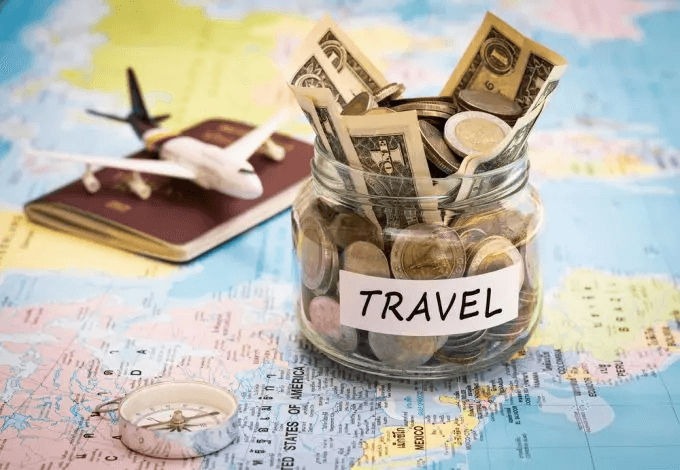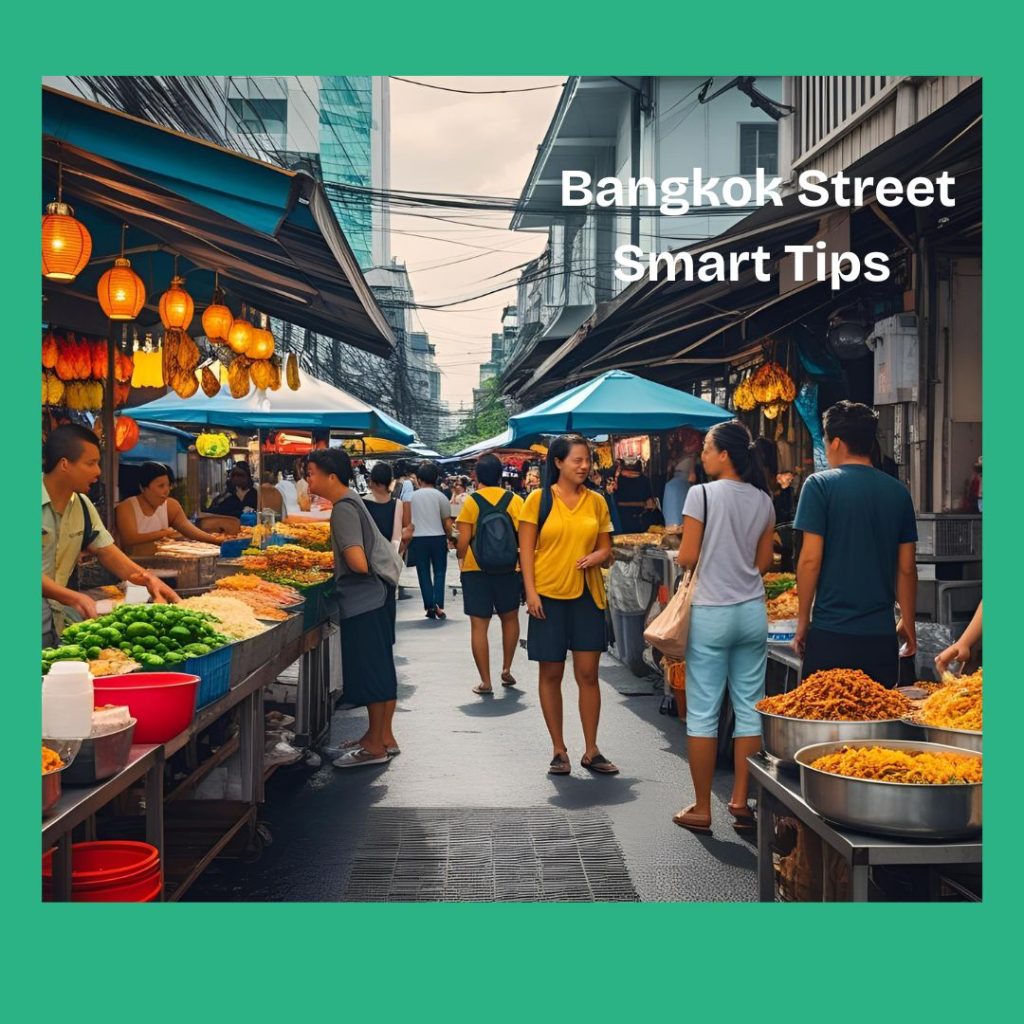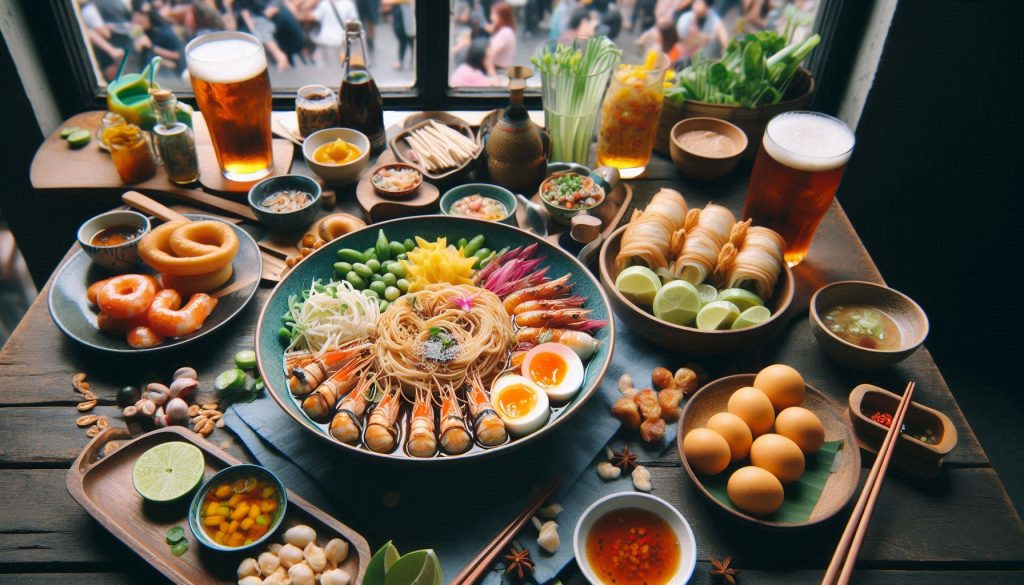You step off the plane in Bangkok, and BAM – the humid air hits you, tuk-tuks are honking everywhere, and you can smell the aroma of the pad thai wafting through the air mixed with exhaust fumes. You’re thinking, “What have I gotten myself into?”
Welcome to Bangkok! The city that will simultaneously overwhelm and enchant every first-time visitor.
Here’s the truth about Thailand’s capital: it’s a beautiful chaos. One minute you’re dodging motorbikes in street markets, the next you’re finding peace in golden temples. Bangkok doesn’t just challenge your travel skills – it rewrites them completely!
These 23 Bangkok travel tips are your secret toolkit to:
✔ Pack smarter (monsoon surprises? Spicy food regrets? Avoided.)
✔ Stay safe (no, that “friendly” gem scammer isn’t your BFF)
✔ Navigate like a local (RIP overpriced tuk-tuks, hello secret river taxis!)
✔ Respect Thai culture (because nobody wants that awkward temple photo fail)
We’re going to demystify everything you need to know before visiting Bangkok, from essential Bangkok packing tips to keeping yourself safe and sound. We’ll delve into the nuances of Thai cultural etiquette so you can confidently immerse yourself, and share some incredible local Bangkok hacks that will make your trip smoother, more authentic, and way more fun. Get ready to transform that first-timer apprehension into pure, unadulterated excitement for your first trip to Bangkok!
What to Pack for Bangkok: Your Essential Thailand Packing List 2026
Wondering what to pack for Bangkok’s tropical heat? Here’s your ultimate Bangkok packing checklist that’ll keep you comfortable in Thailand’s bustling capital. Smart packing for Bangkok can make or break your travel experience.
1. Lightweight Breathable Clothing for Bangkok Weather
Bangkok’s tropical climate demands clothes that breathe with you. Pack cotton and linen while leaving denim at home – think flowy dresses, cotton tees, and linen pants that survive Bangkok’s famous humidity. Your Bangkok clothing essentials should include modest tops for temples and lightweight long sleeves for sun protection.
2. Essential Bangkok Sun Protection and Bug Spray
Bangkok’s sun is intense, and mosquitoes love tourists. High SPF sunscreen is crucial when exploring Chatuchak Market or walking along the Chao Phraya River. Pack DEET-based bug spray to avoid becoming their favorite meal during your Bangkok adventure.
3. Comfortable Walking Shoes for Bangkok Streets
You’ll walk tons in Bangkok, so comfortable footwear is essential. Pack breathable sneakers for markets and flip-flops for temples where you’ll remove shoes. Avoid new shoes that might cause blisters during street food tours.
4. Bangkok Travel Snacks and Hydration Essentials
A reusable water bottle is crucial for surviving Bangkok’s heat while being eco-friendly. Pack healthy snacks from home since finding familiar options initially might be challenging. Staying hydrated is key in Bangkok’s year-round tropical climate.
5. Power Bank and SIM Card for Bangkok Connectivity
Your phone works overtime in Bangkok – navigating BTS, translating menus, capturing moments. A portable power bank ensures you never get stranded without GPS when exploring Bangkok’s streets. Consider a Thailand eSIM for affordable data without expensive roaming charges.
6. Thailand Visa Requirements Before You Travel
Before booking flights to Thailand, check your visa requirements on the government website. Most passports get you a 30-day free visa, but it’s always safer to double-check. Once you’re in Thailand, extending for another 30 days is super easy at any immigration office.
Most offices require you’re at least 15 days into your trip before extending. Bring a photocopy of your passport photo page and visa stamp page, plus proof of accommodation, a passport photo, and 1900 THB (around $53 USD). Then BAM, you’re in paradise for another 30 days without any hassle.
Don’t overstay your Thailand visa – you’ll be charged 500 THB ($14 USD) daily and get an “overstay” stamp that hurts future visa applications. Just play by the rules and everything stays sweet for your Bangkok adventure.
Cultural Etiquette & Local Customs in Thailand: What You Need to Know

Getting to know a few Thai cultural etiquette tips will truly enhance your visit and show respect to the locals. Thailand is known as the “Land of Smiles,” and embracing their customs will make you feel right at home. Understanding these nuances is key for a truly immersive Thailand travel experience.
Thailand Temple Dress Code: What to Wear
Thai temple etiquette requires covering shoulders and knees when visiting any temple. Women need long pants or below-knee skirts with sleeved tops, while men need long trousers and shirts with sleeves. Many temples provide sarongs if you’re underdressed, but come prepared to show proper Thailand cultural respect.
Thai Body Language: Never Touch Heads or Point Feet
The head is sacred in Thai culture, so never touch anyone’s head, including children. Your feet are considered lowest and dirtiest, so pointing feet at people or Buddha statues is deeply offensive. When sitting in temples, tuck your feet away from people and religious objects to show respect.
Thailand Shoe Etiquette: Remove Before Entering
Thai customs require removing shoes before entering homes, temples, and traditional buildings. Look for shoe piles at entrances as your cue to remove yours too. This Thailand tradition keeps sacred spaces clean while showing respect for the area you’re entering.
Respecting Thai Monarchy: Understanding Lèse-Majesté Laws
Thailand has strict lèse-majesté laws protecting the monarchy, making disrespectful royal family comments illegal. Avoid political discussions about Thai royalty and stand respectfully during the national anthem. Show appropriate reverence when visiting royal palaces or seeing royal images.
Respecting Thai Monks and Buddhist Culture
You’ll encounter orange-robed monks throughout Thailand who are highly respected in Thai culture. Never touch monks, especially women, and don’t sit next to them on transport or position yourself higher than them. These Buddhist etiquette rules show deep respect for Thailand’s spiritual traditions.
The Power of Smiling in Thai Culture
Thai people love to smile and resolve conflicts peacefully rather than through confrontation. Getting angry or confrontational isn’t commonplace in Thailand, as locals work out problems with smiles and patience. Embrace this positive Thai cultural norm and you’ll have much better interactions with locals.
Money & Budgeting Tips for Bangkok: Your Complete Thailand Travel Finance Guide

Planning your Bangkok budget and wondering about the best ways to handle money in Thailand? Here’s everything you need to know about Thailand currency exchange, Bangkok ATM fees, and smart budgeting tips for your trip to the Land of Smiles.
Bangkok ATM Fees: Why You Should Withdraw Large Amounts
Bangkok ATMs charge around 220 THB (about $6 USD) per withdrawal for international cards, making small frequent withdrawals expensive. Smart Bangkok money tips include withdrawing larger amounts in one go to minimize these fees over your trip. Most Thai ATMs have withdrawal limits of 20,000 THB ($550), with some banks like Bangkok Bank allowing up to 25,000 THB ($687).
Choose official bank ATMs like Bangkok Bank or Krungthai for reliability and use them during daylight hours for safety. This Bangkok budgeting strategy saves you significant money compared to multiple small withdrawals throughout your stay.
Currency Exchange vs ATM: Which is Better in Bangkok?
Currency exchange booths in Thailand typically offer better rates than ATMs, with exchanges providing around 44-44.5 THB per British pound compared to ATM rates of 42-42.5 THB. Avoid airport currency exchange as city locations like SuperRich or Value+ offer much better Thailand exchange rates for your travel budget.
For the best Bangkok money exchange strategy, bring clean, newer bills and exchange larger amounts at reputable city exchanges rather than using ATMs for everything. This Thailand travel money tip can save you hundreds of baht over your trip.
Cash vs Card: What Works Best in Bangkok?
Cash remains king in Bangkok, especially for street food stalls, tuk-tuk drivers, and small market vendors who prefer Thai baht in hand. Keep small denomination notes handy as many vendors can’t make change for large bills or don’t accept cards for small purchases.
Credit and debit cards work well at malls like MBK and Terminal 21, hotels, chain restaurants, and larger supermarkets. Some shops have minimum spend requirements for cards (usually 40-70 THB) and smaller places might charge card fees, making cash essential for Bangkok street experiences.
Mobile Payments and Digital Wallets in Bangkok
Thailand uses TrueMoney Wallet and PromptPay for digital payments, popular at 7-Eleven stores and food courts. However, most Thai e-wallets require a Thai phone number and local ID, making them difficult for tourists to register and use effectively.
Stick with cash and international cards as your primary Bangkok payment methods. While locals love digital payments, tourists find traditional payment methods more reliable for their Thailand travel experience.
Essential Bangkok Money Apps and Tools
Download helpful Bangkok travel apps before your trip, including Grab for rides and food delivery, Google Maps for BTS navigation, and LINE for communicating with local businesses. Some tourist SIM cards from AIS or DTAC include Grab or Foodpanda discounts, so check for these deals at the airport.
Always carry small Thai baht notes for street vendors and download apps before traveling, as some Thai SIM cards require verification before app store downloads. These Bangkok travel hacks make your money management much smoother during your Thailand adventure.
Bangkok Street Smart Tips: Your Essential Thailand Safety Guide

Wondering how to stay safe and savvy in Bangkok’s bustling streets? These Bangkok street smart tips will help you navigate Thailand’s capital like a pro while avoiding common tourist traps and scams that target first-time visitors.
How to Haggle Respectfully at Bangkok Markets
Bangkok market bargaining is an art that requires patience and respect for local customs. Start by offering about 30-40% of the asking price and negotiate with a smile, remembering that haggling should be fun, not aggressive. Thai vendors appreciate polite negotiation and you’ll often get better deals with friendly banter than with pushy tactics.
Practice your Bangkok shopping tips at places like Chatuchak Weekend Market or JJ Green Night Market where bargaining is expected. Remember that fixed-price malls like MBK or Terminal 21 don’t allow haggling, so save your negotiation skills for traditional markets and street vendors.
Avoiding Bangkok Scams: Gems and Tuk-Tuk Tours
Bangkok gem scams are notorious tourist traps where friendly locals convince you to buy “discounted” gems that are actually worthless glass. Never follow strangers to gem shops, even if they claim to be students or government officials offering special deals. Similarly, avoid tuk-tuk drivers offering incredibly cheap city tours that end up being shopping scams in disguise.
Tuk-tuks will approach you at tourist spots and tell you the place is closed for the day. Instead, they’re happy to take you on a city tour. These Bangkok tourist scams typically involve taking you to overpriced shops where drivers earn commissions on your purchases.
Bangkok Floating Markets: Which Ones to Visit Safely
Skip overly commercialized floating markets like Damnoen Saduak unless you’re with a trusted local guide who can help you avoid tourist traps. These markets often charge inflated prices and offer poor-quality experiences compared to authentic local markets. Instead, consider visiting Amphawa Floating Market or Taling Chan Floating Market for more authentic Bangkok cultural experiences.
For the best Bangkok market tips, go early in the morning when vendors are setting up and prices are more reasonable. Local markets offer better Bangkok street food experiences and more genuine interactions with Thai vendors.
Bangkok Navigation Tips: Stay Connected and Aware
Keep Google Maps downloaded offline and use it constantly – many Bangkok attractions are surprisingly walkable once you know the routes. The BTS Skytrain and MRT systems are efficient and safe, making navigation easier than relying on potentially unreliable taxi meters or tuk-tuk drivers.
Download translation apps and keep your phone charged with a portable power bank, as navigation and communication tools are essential for Bangkok street safety and getting around confidently.
Bangkok Pickpocket Prevention in Crowded Areas
When walking through crowded tourist areas like Khao San Road or Chatukchak Weekend Market, keep your belongings close and always be vigilant when someone gets a little too close. Use a crossbody bag with zippers facing your body and avoid displaying expensive jewelry or large amounts of cash in busy areas.
Stay alert in crowded Bangkok shopping areas like MBK Center and Siam Paragon where pickpockets target distracted tourists. Keep your passport and extra cash locked in your hotel safe, carrying only what you need for the day to minimize losses if theft occurs.
Avoiding Common Pitfalls: Smooth Sailing in Bangkok
To ensure your Bangkok trip is as amazing as possible, let’s chat about a few common snags many first-timers encounter. Knowing these Bangkok travel mistakes to avoid will help you have a truly unforgettable experience. You want to make the most of every moment, right?
First off, while Bangkok’s temples are absolutely breathtaking, don’t try to see them all in one go. It’s easy to get “templed out” if you overschedule, leading to spiritual fatigue instead of awe. Instead, pick a few key temples you truly want to explore and take your time appreciating their beauty and tranquility.
As we touched on earlier, carrying enough cash in Bangkok is incredibly important. Many fantastic street food stalls, small shops, and local markets, which are the heart of Bangkok’s charm, often don’t accept cards. Having small denominations of Thai baht on hand will save you hassle and ensure you can enjoy all the authentic local flavors.
Keep a keen eye out for obvious tourist traps in Bangkok. While places like the Maeklong Railway Market are fascinating, some of their “shows” or certain souvenir stalls can be overpriced and geared solely for tourists. Always do a quick check or ask around for recommendations if something feels a little off, helping you avoid those less authentic experiences.
Finally, be aware of what’s known as duplicate pricing in Thailand, where some vendors or attractions might quote a different price for locals versus tourists. While this isn’t universally applied, it’s something to politely query if you suspect it. Knowing the general price range for items or services can help you navigate these situations and ensure you’re paying a fair price during your Bangkok adventure.
Food & Drink Tips: Savoring Bangkok’s Flavors

Get ready, because the food scene in Bangkok is an absolute dream, and diving into it is one of the best parts of your trip! To truly experience the city, you simply must indulge in some quintessential Thai dishes. Imagine digging into a savory Pad Thai, refreshing Som Tum (papaya salad), succulent grilled pork skewers, and, of course, the heavenly sweet Mango Sticky Rice for dessert – these are just a few of the must-try foods in Bangkok.
When it comes to where to eat in Bangkok, your options are endless and exciting! For an incredible variety, head straight to places like the bustling Chatuchak Weekend Market or the vibrant streets of Chinatown, which are famous for their endless rows of Bangkok street food vendors. Don’t be shy; these local spots offer some of the most authentic and delicious culinary experiences you’ll find, often at incredibly affordable prices.
A crucial Bangkok travel tip for your health is to always remember: don’t drink tap water! Stick strictly to bottled or filtered water to stay safe and healthy throughout your journey. You’ll find bottled water readily available everywhere, from 7-Elevens to street stalls.
Finally, if you’re not a fan of intense heat, here’s a phrase that will be your best friend: when ordering food, simply say “mai pet” (pronounced “my pet”) to your server. This means “not spicy” and will help you manage the spice levels to your preference, ensuring you can fully enjoy every delicious bite of Thai cuisine.
Safety, Health & Emergency Info: Staying Safe in Bangkok
Navigating a new city is always an adventure, and knowing a few key Bangkok safety tips can give you immense peace of mind. While generally safe, being prepared for any situation is smart, especially when it comes to your health in Thailand.
First and foremost, jot down these crucial emergency numbers for Thailand: dial 1155 for the Tourist Police, who are specifically there to assist visitors, and 191 for general emergencies. Having these readily accessible on your phone or a small card can be a lifesaver in unexpected situations.
It’s also a fantastic idea to grab a hotel card with its Thai address from the reception desk as soon as you check in. If you ever get turned around or lost, especially when trying to explain your destination to a taxi driver or local, simply showing them the card will solve the problem instantly. It’s a simple but effective Bangkok navigation hack.
Considering the unexpected, make sure you carry comprehensive travel insurance that specifically covers medical emergencies and hospital visits. While we hope you won’t need it, healthcare costs can add up quickly, and having that safety net is invaluable for your travel health in Bangkok. It’s a wise investment for any international trip.
Lastly, and this is so important in Bangkok’s tropical climate: stay incredibly hydrated. The heat and humidity are no joke, and heat exhaustion is a real risk. Drink plenty of bottled water throughout the day, even if you don’t feel thirsty, to ensure you stay energized and healthy while exploring the city’s wonders.
Bonus: Apps Every Traveler Should Download & Essential Thai Phrases
In today’s connected world, your smartphone can be your best travel companion, especially in a bustling city like Bangkok. Having these essential apps for Thailand travel downloaded before you even land can make your trip smoother and more enjoyable. Think of them as your digital toolkit for exploring.
While many locals in Bangkok’s tourist hotspots speak English quite well, putting in a little effort to learn some basic Thai phrases truly goes a long way and can make locals smile! It shows respect and opens doors to more genuine interactions, especially when you venture into slightly more remote areas.
Try saying “Sawa dee” for hello, “Kop kun” for thank you, “Chai” for yes, or “Mai” for no.
If you’re wondering about costs, “Tao rai?” means “How much?” and if the spice is too much, “Mai pet!” means “Not spicy!”
You can also express your delight with “Aroi mak,” meaning “Very delicious,” or check in on someone with “Sabai dee mai?” for “How are you?”
And for those minor mishaps, “Mai pen rai” (No problem) is wonderfully versatile. Lastly, if something seems a bit too much, “Peng mak” means “Very expensive.”
First up on the app front, Grab is an absolute lifesaver for transportation, effectively serving as Thailand’s version of Uber or Lyft. It’s incredibly reliable for booking taxis or even motorbike taxis, helping you get around Bangkok easily and often at a more transparent price than hailing a cab on the street. It’s also fantastic for food delivery, a convenient option after a long day of sightseeing.
Google Translate is a non-negotiable. While English is spoken in tourist areas, having the ability to instantly translate signs, menus, or even basic conversations will significantly enhance your interactions with locals. You can even download the Thai language pack for offline use, making it an indispensable tool for communication in Bangkok.
For navigation, Maps.me or Google Maps (especially with offline maps downloaded) are vital. Bangkok’s streets can be a maze, and having reliable, offline maps ensures you can always find your way, even without an internet connection. This is a game-changer for walking around and figuring out public transport routes like the BTS and MRT, helping you master Bangkok navigation.
And here’s a gem for discovering unique experiences: Thrillark is highly recommended for finding and booking local attractions and tours. It’s excellent for discovering hidden gems and authentic experiences, allowing you to easily browse and secure tickets or guided tours, ensuring you make the most of your Bangkok itinerary and uncover some truly special moments.
Finally, the LINE app is Thailand’s dominant messaging platform, widely used by locals and even many small businesses. You might find hotels or tour operators communicate via LINE, and it can be helpful for quick messages or inquiries once you’re there. Downloading these apps will definitely make your trip to Bangkok a more seamless and connected experience!
FAQ Section: Your Quick Bangkok Queries Answered
Got a few quick questions buzzing in your head about Bangkok? Don’t worry, my friend, these frequently asked questions about traveling in Bangkok will give you the concise answers you need to feel fully prepared.
Q.1 Is Bangkok safe for solo female travelers?
Absolutely, Bangkok is generally considered very safe for solo female travelers. Like any big city, it’s wise to be aware of your surroundings, especially in crowded areas or late at night. Stick to well-lit streets and use reputable transport like Grab, and you’ll find the locals incredibly welcoming and helpful, making for a comfortable and enjoyable solo adventure.
Q.2 How much cash should I carry daily in Bangkok?
It’s a good idea to carry around 1,000 to 1,500 Thai Baht (approximately $27-$40 USD) in cash per day for your general expenses, especially for street food, local markets, and smaller shops. While cards are accepted at malls and hotels, cash is definitely king for many of the most authentic and budget-friendly experiences. Remember, ATMs are available, but withdraw larger amounts to reduce fees.
Q.3 Do I need to tip in Thailand?
Tipping in Thailand isn’t as strictly expected as in some Western countries, and many restaurants will already include a service charge on your bill. However, for exceptional service, a small gratuity is always appreciated, especially by those in the service industry whose wages might be lower. Rounding up your taxi fare or leaving a 20-50 Baht tip for good service at a massage parlor or local eatery is a kind gesture.
Q.4 What’s the best SIM card for tourists in Bangkok?
For tourists looking for the best SIM card in Thailand, the main providers are AIS, DTAC, and TrueMove H, all offering excellent tourist packages. AIS is generally known for the fastest internet speeds, while DTAC often boasts better coverage in island areas. You can easily purchase these at the airport upon arrival or at convenience stores and official telco shops in the city, providing seamless Bangkok connectivity throughout your trip.
The Thai-nal Word: Ready for Your Bangkok Blast!
So there you have it, friend! Bangkok is an incredible city, a beautiful blend of delightful chaos and undeniable charm. With these tips tucked into your back pocket, you’re not just visiting; you’re ready to truly experience it, turning any potential overwhelm into pure magic. Get ready to embrace the energy and create unforgettable memories.
Now, to truly elevate your adventure and skip any queues, make sure to check out top-rated Bangkok experiences and skip-the-line tickets on Thrillark. Get ready to dive in and Bangkok-roll into an unforgettable journey!


